Sacred Ally Quilts visibly underscore anti-racism work in New Hampshire
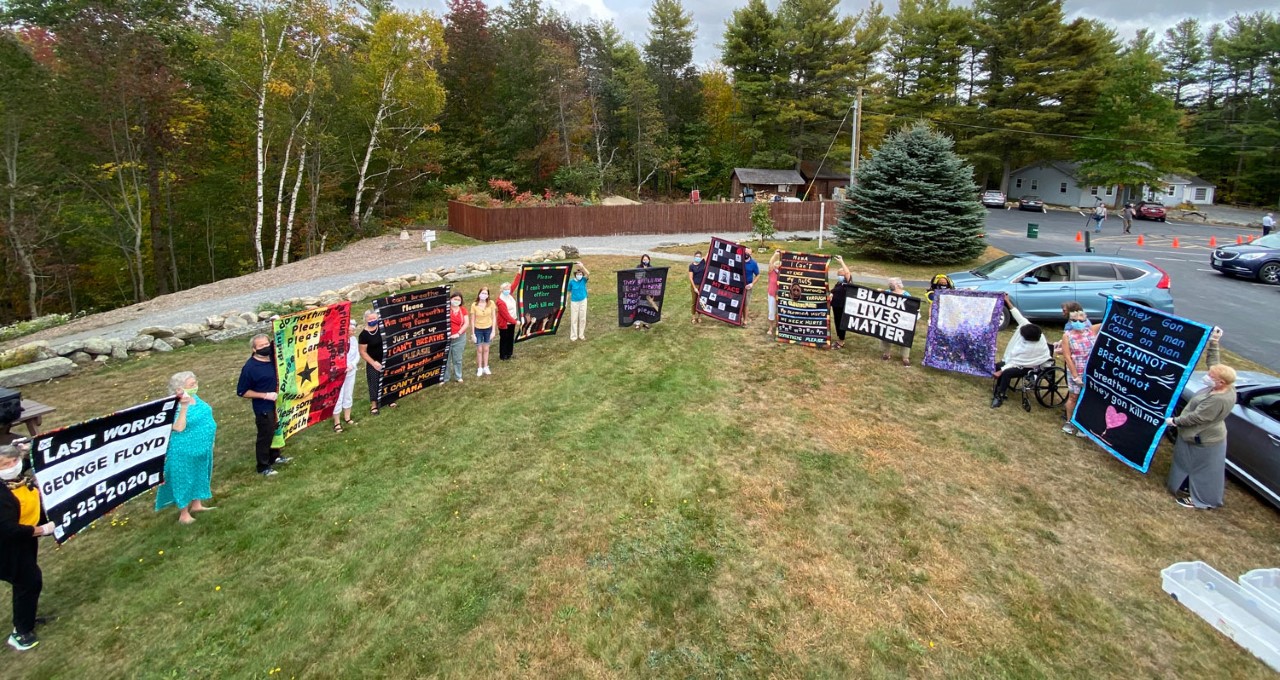 Nine United Church of Christ congregations in New Hampshire have collaborated to create a project to “prove that racism is not the only reality.” Through a series of quilts that display the last words of George Floyd, they offer a visible symbol, a graphic reminder, of the need for racial justice.
Nine United Church of Christ congregations in New Hampshire have collaborated to create a project to “prove that racism is not the only reality.” Through a series of quilts that display the last words of George Floyd, they offer a visible symbol, a graphic reminder, of the need for racial justice.
“Immortalizing these tragic words, centers this expression of allyship on the words of a Black man,” said the Rev. Mark Koyama, pastor of the United Church of Jaffrey, which initiated the Sacred Ally Quilt Project. “The white man who killed Mr. Floyd did not listen to these words, but we do. We listen attentively. In response, we create. In response, we remember. In response, we are changed.”
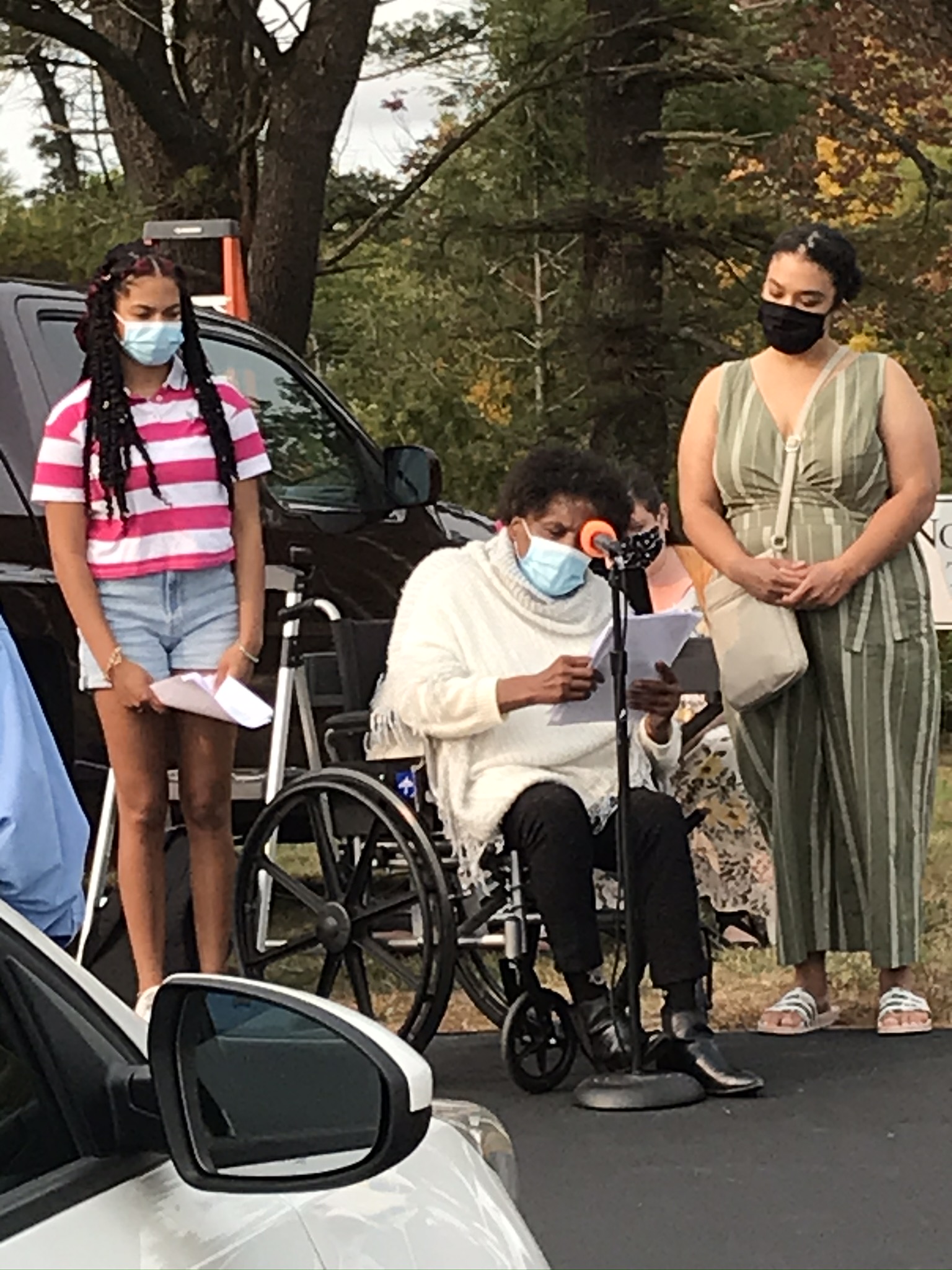 When the United Church of Jaffrey invited participation in the project after Floyd’s death at the hands of Minneapolis police on May 25, nine churches in five counties came together this summer to create 10 quilts.
When the United Church of Jaffrey invited participation in the project after Floyd’s death at the hands of Minneapolis police on May 25, nine churches in five counties came together this summer to create 10 quilts.
Harriet Ward, a member of Pilgrim United Church of Christ, Brentwood-Kingston, and chair of the New Hampshire Conference’s racial justice mission group, produced two of them. She worked in the empty sanctuary, for hours a day, in quiet contemplation.
“I am a lifelong quilter. It’s my art and it’s my zen,” said Ward. “I am also the only African American in my church, one of few in my Conference and as I expected, the only African American in this group of quilters. I have a different voice and I wanted it there. I have really strong ideas about what it means to be an ally. An ally would intentionally reach out to the individual or community they want to stand with. I wanted to push that concept.”
Floyd’s last words were divided in eight stanzas, after “deep reflection” by an African American parishioner. Each of the stanzas, which reflected Floyd’s discomfort, pain and death, was made visible on a quilt, with two others added to give the display a visual beginning and end.
‘I can’t breathe’
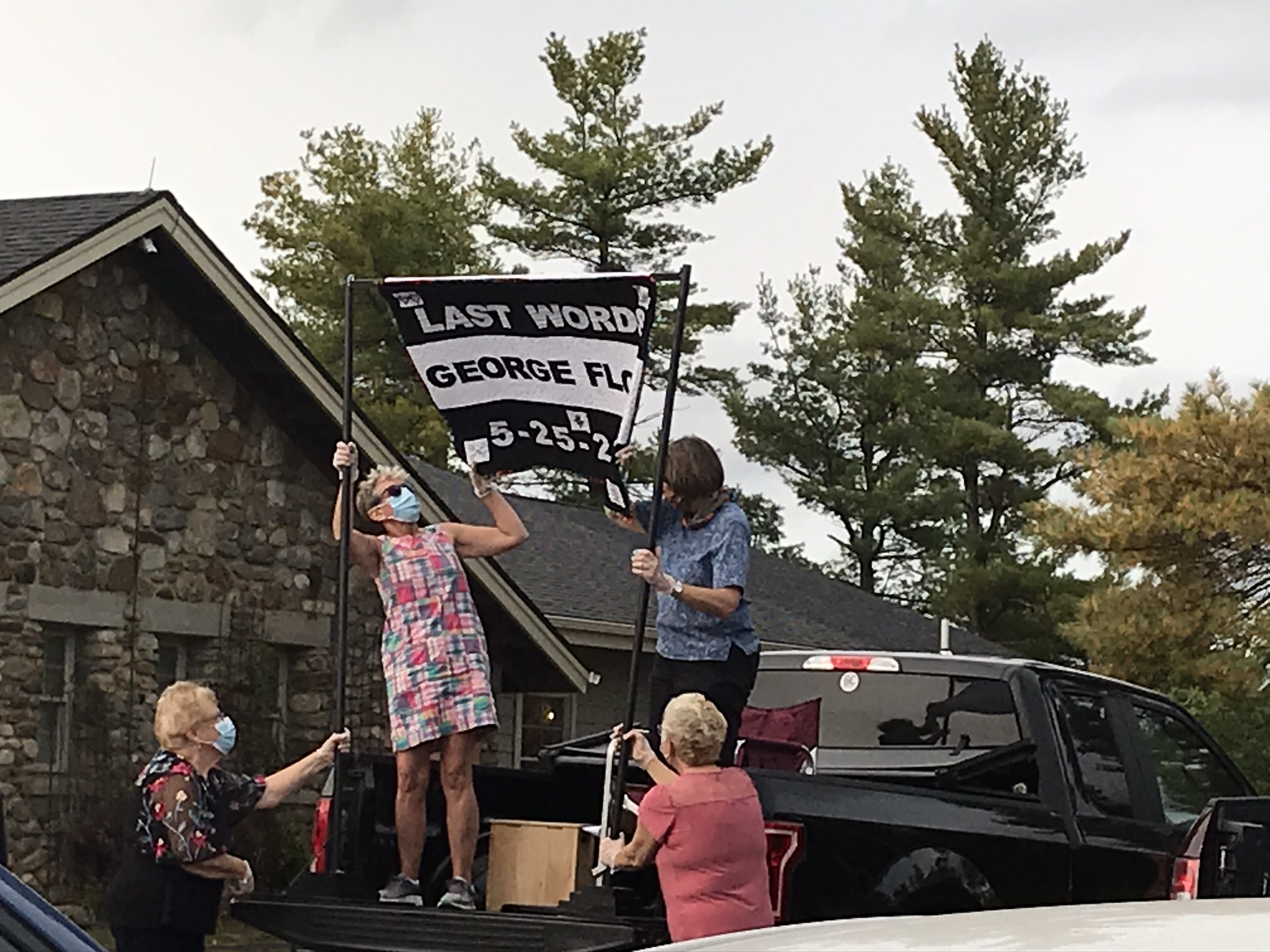 “This is not a current event or a headline to me. It’s centuries old. The words are emblematic,” Ward said. “George Floyd said them but all of us have been making that cry since 1618 when the ancestors departed. I thought my quilts would tell a different story. And indeed, they do not look like the others — but then neither do I.”
“This is not a current event or a headline to me. It’s centuries old. The words are emblematic,” Ward said. “George Floyd said them but all of us have been making that cry since 1618 when the ancestors departed. I thought my quilts would tell a different story. And indeed, they do not look like the others — but then neither do I.”
“One of the strengths of this project is that it brings in a lot of diverse voices,” said Koyama. “The church is, in a sense, the perfect social institution for this, highly attuned to the power of symbolism – like the cross – for thousands of years. With a project with symbolic resonance you create the possibility for meditation and intentional consideration of these complex social issues that face us. It transforms words that have mortal significance.”
‘An uncomfortable education’
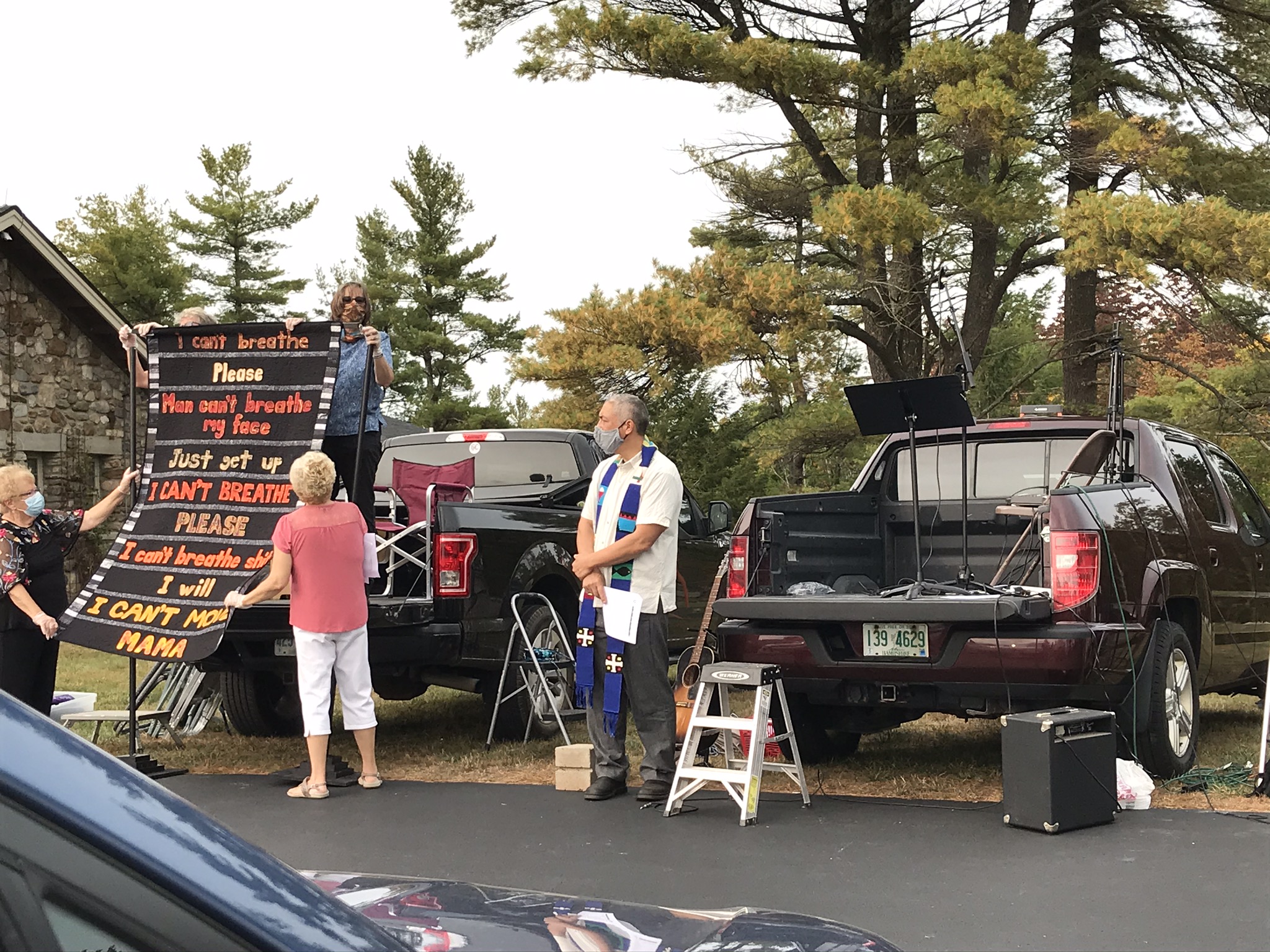 “Several of us at Stratham Community Church were horrified at George Floyd’s brutal treatment and murder and the other stories of systemic injustice against Black people and wanted to do something,” said Phyllis Lurvey, coordinator of that church’s quilt. The congregants, who are between pastors and are concerned about COVID-19, embraced the idea of participating in this project to “keep the conversation about rejecting racism and finding just solutions in the long term.”
“Several of us at Stratham Community Church were horrified at George Floyd’s brutal treatment and murder and the other stories of systemic injustice against Black people and wanted to do something,” said Phyllis Lurvey, coordinator of that church’s quilt. The congregants, who are between pastors and are concerned about COVID-19, embraced the idea of participating in this project to “keep the conversation about rejecting racism and finding just solutions in the long term.”
The Stratham group met on the church lawn, shared information on books they were reading and became more interested in the history of slavery. A few members of the congregation started a Facebook page to share resources online.
“We have all become so much more aware of how our white experience differs from that of our Black fellow citizens,” Lurvey said. “It’s been an uncomfortable education.”
“’I can’t breathe’ is the lamentation of centuries,” said Ward. “The ancestors lost their breath when they were stolen from their homes. The gagging stench of sickness, death, fear and depression stifled the breath of the captive Africans pressed into the stagnant dark hold of a ship to the unknown. And upon reaching the unknown to a life of forced labor, they gasped strange, hostile air while their culture, language and even their names were beaten away until they could not breathe the dust of their remains. And still forlorn, we hold our breath and smother our authentic voices to conform and to survive. We cannot breathe.”
‘Moving and deeply meaningful’
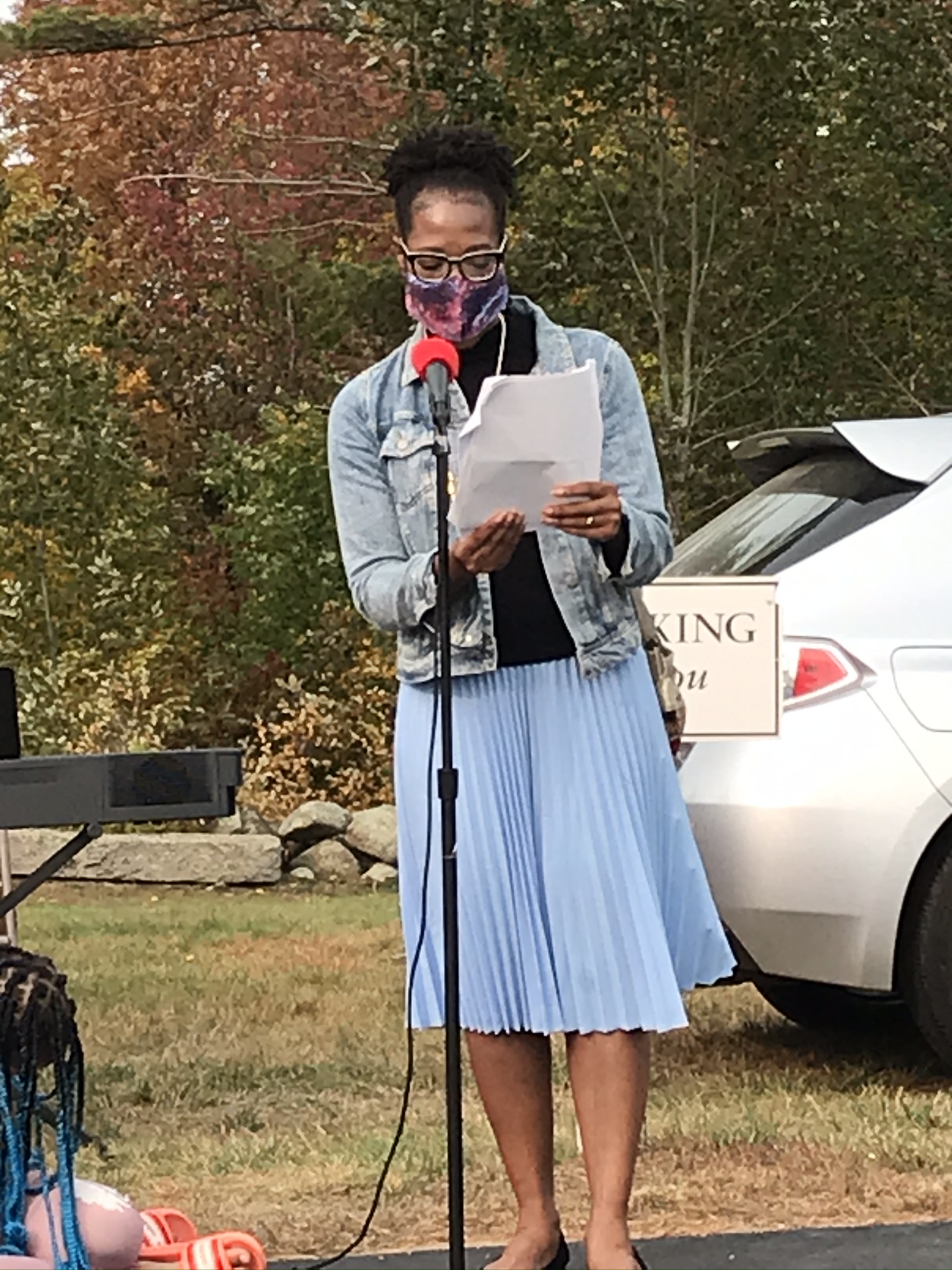 “It was a deeply meaningful project, both beautiful and terrible at the same time,” said Jill Smart, a member of South Congregational Church in Concord. “I hope that when others see it, they will be moved to action. For me, it was an honor to participate and take this small step toward naming injustice and working towards a better future for all people.”
“It was a deeply meaningful project, both beautiful and terrible at the same time,” said Jill Smart, a member of South Congregational Church in Concord. “I hope that when others see it, they will be moved to action. For me, it was an honor to participate and take this small step toward naming injustice and working towards a better future for all people.”
Kathy Blair, a quilter from the United Church of Christ in Keene, spent her time reading about racism while working on her quilt panel. She said it was “a deeply moving experience” she was glad to share with a few young people from her congregation.
“From the beginning I felt it was important for youth from our church to participate,” Blair said. “Seven youth from five families assisted in cutting out the lettering on the quilt. My hope is that the desire to work for social justice takes hold and is nurtured in their hearts.”
“As followers of Jesus, we are called to stand with folks who are on the margins of society, folks who do not hold power, folks whose voice has been stripped from them,” said the Rev. Tara Olsen Allen, pastor of Pilgrim UCC. “When we say ‘Black Lives Matter’ it is akin to saying ‘blessed are those who mourn.’ It does not mean others are less blessed but in this time and place we need to stand with our Black and Brown family members in love against racism, fear and hate. These Sacred Ally Quilts provide a visible way to do just that.”
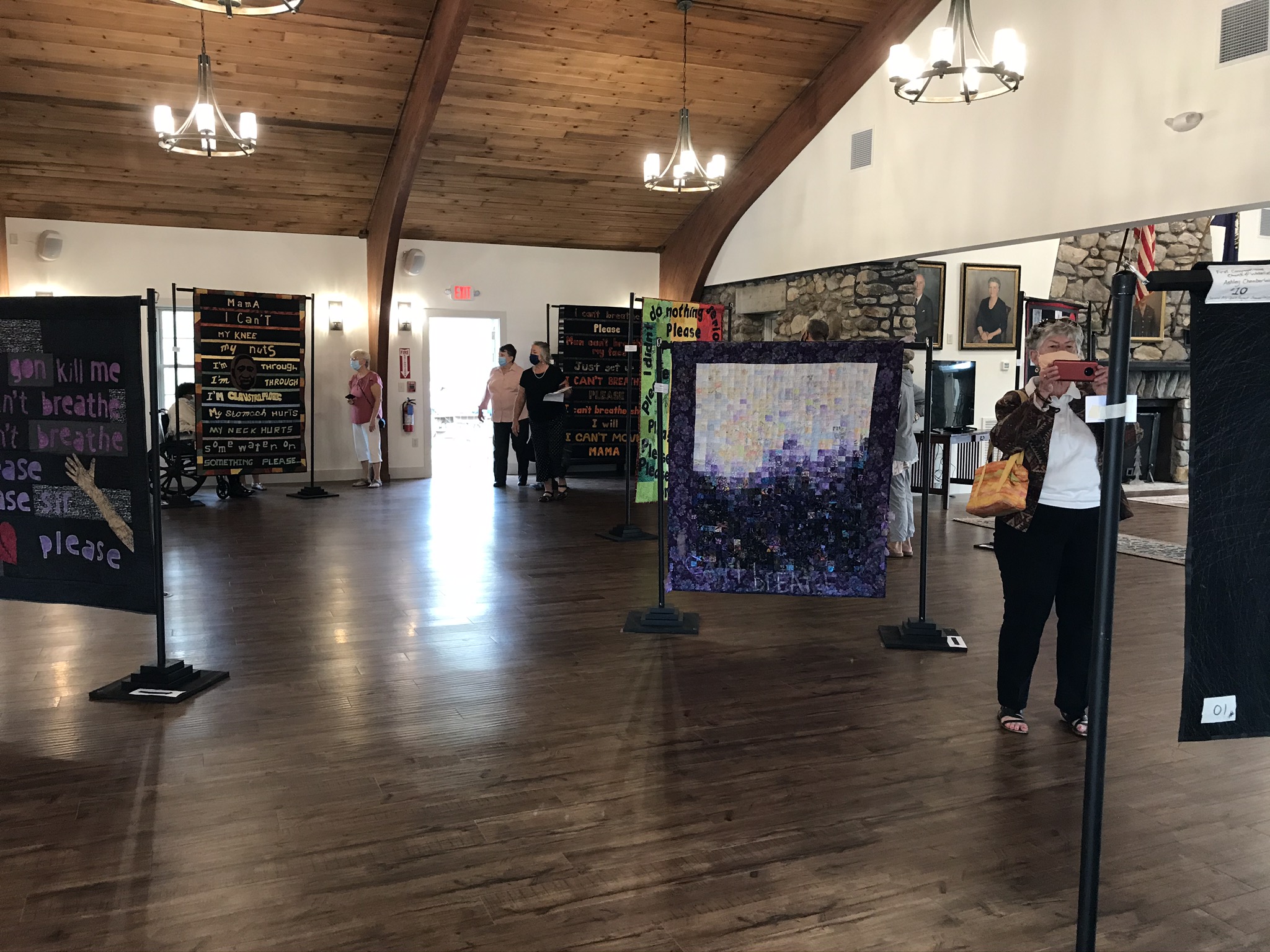 “Once of the things that was quite meaningful to me was, at the culmination of the creative part of the project, getting them together, going from church parking lot to parking lot to pick up the quilts and meeting people for the first time, doing the laying on of hands and a prayer. It was just a profound journey, almost a pilgrimage, collecting these artifacts of the moment,” Koyama said. “To experience the welcome of all these people. I’m glad that the church could provide the context for this project.”
“Once of the things that was quite meaningful to me was, at the culmination of the creative part of the project, getting them together, going from church parking lot to parking lot to pick up the quilts and meeting people for the first time, doing the laying on of hands and a prayer. It was just a profound journey, almost a pilgrimage, collecting these artifacts of the moment,” Koyama said. “To experience the welcome of all these people. I’m glad that the church could provide the context for this project.”
The quilts were blessed and dedicated on Sunday, Sept. 27, at the Cathedral of the Pines, Rindge, N.H. They will be displayed by all the contributing congregations, with a schedule that is now in development.
“We look forward to having this project travel to our congregation and others to spearhead discussion and action.” Lurvey said. “The ripples are widening.”
Participating churches – The United Church of Jaffrey; The United Church of Christ in Keene; First Congregational Church of Wolfeboro; First Congregational Church of Wakefield; First Church Pelham; The Federated Church of Marlborough; Pilgrim United Church of Christ, Brentwood-Kingston; South Congregational Church of Concord; Stratham Community Church.
Photos courtesy of Cary Hardwick
Related News
A Prophetic Call for Justice and Peace in Palestine
The executive leaders of the United Church of Christ have issued the following statement...
Read More‘Love is Greater Than Fear’: Regional Youth Events get to the heart of gospel message
United Church of Christ teens attending this summer’s Regional Youth Events (RYE) are...
Read MoreUCC desk calendars available to order now
Prepare for your day, month and year with the United Church of Christ desk calendar —...
Read More


